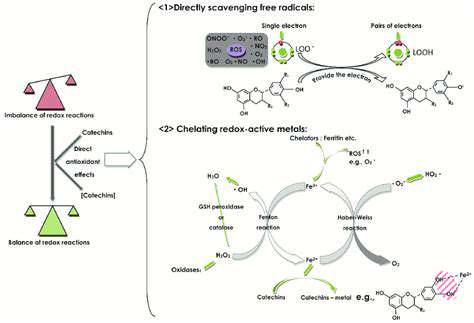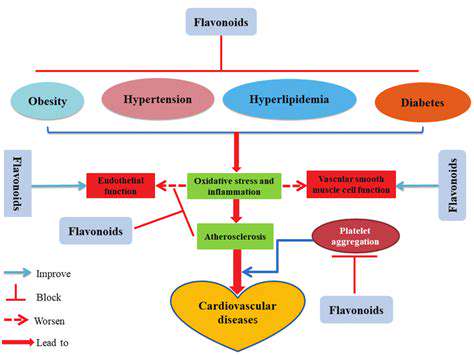Health Benefits of Green Tea
Nature's Antioxidant Powerhouse
For centuries, green tea has been cherished not just for its delicate flavor but for its extraordinary health-promoting properties. The secret lies in its rich concentration of catechins, a type of polyphenol that acts as nature's defense system against oxidative stress. These molecular warriors neutralize free radicals - unstable compounds that accelerate cellular aging and contribute to various health concerns.
Modern science continues to uncover how these bioactive compounds work at the cellular level. Epigallocatechin gallate (EGCG), the most abundant catechin in green tea, has shown particular promise in laboratory studies for its protective effects against DNA damage. While research is ongoing, the cumulative evidence suggests regular green tea consumption may help maintain cellular integrity.
Metabolic Enhancement Properties
Beyond its antioxidant capacity, green tea contains a unique combination of caffeine and L-theanine that creates a gentle metabolic boost. Unlike coffee's abrupt stimulation, this synergy provides sustained energy without jitters. The thermogenic effect - where the body generates heat from digesting food - appears modestly enhanced by green tea compounds.
Nutrition experts emphasize that green tea works best as part of comprehensive lifestyle approach including balanced nutrition and regular activity. Its ability to support fat oxidation makes it particularly valuable for those managing weight, though it's not a standalone solution.
Cardioprotective Potential
Emerging epidemiological data paints an encouraging picture of green tea's cardiovascular benefits. The flavonoids in green tea may help maintain healthy blood pressure already within normal range and support optimal cholesterol metabolism. Population studies in regions with high green tea consumption show interesting correlations with cardiovascular health markers.
It's worth noting that these effects appear most pronounced with consistent, long-term consumption. The endothelial function - crucial for vascular health - seems particularly responsive to green tea's bioactive compounds according to recent clinical trials.
Cellular Defense Mechanisms
The scientific community has shown growing interest in green tea's potential role in cellular health maintenance. Laboratory studies demonstrate that EGCG may influence signaling pathways involved in cell cycle regulation. While human studies are still developing, the existing data warrants serious consideration of green tea as part of a prevention-oriented lifestyle.
Researchers emphasize that these potential benefits are likely dose-dependent and influenced by individual genetic factors. The synergistic effect of green tea's multiple compounds may be more significant than any single component.
Cognitive Performance Enhancement
The combination of moderate caffeine and L-theanine in green tea creates a unique nootropic effect. Unlike the abrupt stimulation of coffee, green tea provides alertness with improved focus and reduced anxiety. Functional MRI studies show this combination may enhance alpha brain wave activity associated with relaxed concentration.
Regular consumers often report improved mental clarity and sustained energy levels without the crashes associated with other caffeinated beverages. This makes green tea particularly valuable for knowledge workers and students seeking natural cognitive support.
Daily Wellness Ritual
What makes green tea truly remarkable is how easily it integrates into modern lifestyles. From traditional loose-leaf preparations to convenient high-quality bagged options, it offers flexibility for any schedule. The ritual of preparing and savoring tea itself can be a mindfulness practice, adding psychological benefits to its physiological advantages.
Seasonal variations - hot brews in winter and iced infusions in summer - make it a year-round wellness companion. The growing availability of premium organic options ensures purity and maximizes potential health benefits.
Gut Health and Microbiome Support
Cutting-edge research reveals fascinating connections between green tea consumption and gut microbiota composition. The polyphenols in green tea appear to act as prebiotics, nourishing beneficial bacterial strains. This emerging area of study suggests green tea may contribute to the gut-brain axis - the biochemical signaling between digestive system and central nervous system.
While individual responses vary, many regular drinkers report improved digestion and reduced bloating. The anti-inflammatory properties of green tea compounds may explain these anecdotal observations, though more clinical research is needed to fully understand these mechanisms.



Read more about Health Benefits of Green Tea
Hot Recommendations
- Traditional Foods for Day of the Dead
- Food Etiquette in Italy: Pasta Rules!
- Best Family Friendly Restaurants with Play Areas in [City]
- Review: The Best [Specific Dessert] Place in [City]
- Top Ice Cream Parlors in [City]
- Traditional Foods for Halloween
- The History of the Potato in Ireland
- Best Vegan Pizza Joints in [City] [2025]
- Best Bakeries for Sourdough Bread in [City]
- Food Culture in Argentina: Asado and Wine










